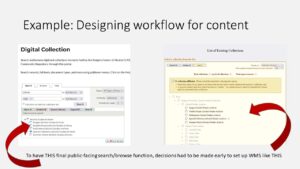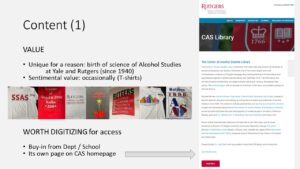As the first of a series of presentations on recent digital projects at New Brunswick Libraries (NBL), today I had a chance to present the digital alcohol studies archives to NBL Faculty. I shared my thoughts about what it entailed as a project and what it required from the librarian. I focused on the factors defining digital projects divided into content elements and format types, illustrating them with some examples. I hope attendees took away a few ideas to start a conversation about the future of digital projects at NBL. Please see my slideshow (black and white).
I received the following three questions (bold by me for emphasis):
- What is required to steward a digital project from start to finish at RUL?
- Workflow considerations: documentation, seeking/getting approval, timelines, pitfalls to be mindful of, areas of strength?
- What abilities/skills do archivists and librarians need in this area? What does the organization as a whole need?
Not a usual digital project, not a typical librarian
The digital alcohol studies archive is not a usual digital project, given its history and various iterations over time. I’m also the typical librarian: I was the instructor teaching the Digital Library Technologies course at SC&I (2007-2014). As such, I gained experience teaching and working with various platforms and projects as well as managing my own project, while training and supervising students. Most importantly, I was the sole decision-maker for all the content. Some of my project goals are the same as those for every single digital project: we want to preserve valuable items for the future, and we want to provide better access to the collection.
The digital alcohol studies collection is quite unique and not your typical digital project. It had its roots in the alcohol history database created by previous librarians at the Center of Alcohol Studies (CAS), which was shut down by RUL in 2016. However, I managed to salvage all the items we had digitized over time for the various versions on platforms like Omeka, Drupal, and Scarletapps. During the COVID-19 pandemic, I had the opportunity to revive the project, officially starting in the spring of 2021, this time using WordPress.
One of the key goals of this project, like any other digital project, was to preserve valuable items for the future and provide better access to the collection. Additionally, the project served as a model for preserving alcohol history and provided insights into the history of science and its implications.
Content and format as defining factors of digital projects
Content played a crucial role in defining the project. The collection’s unique value and support from stakeholders, including the current CAS director, were instrumental in the continuation of the project. Challenges such as copyright issues, sensitive content, and confidentiality had to be addressed and used as guidelines for inclusion.
Format was another defining factor, impacting digitization efforts, platform choices, and workflow management. We had to consider the variety of materials and their appropriate handling, scanning, and storage methods as well as their representative role in the collection, with an eye to potential digitization initiatives in the future.
Collaboration was key throughout the project, involving various departments and personnel from RUL units and beyond. Securing approval first, and then scheduling each task in a meaningful and cost/time-effective manner were some major challenges we faced. Decisions about content and format were there to help.
 The librarian’s role
The librarian’s role
I started a list with the activities that constitute the librarian’s role in a digital project using key verbs such as select, design, pilot, get approved, manage, decide, do all tasks, inspire & train others, supervise implementation, assess, adjust, keep on track, document, promote, etc.
The most important skill is understanding how digital collections work from platforms to access and workflows and understanding how they work within RUL. This takes time and keeps changing. Anyone can learn how to design a digital collection from idea to deliverable by doing it, preferably in bits and pieces, starting small. Project management, marketing, and promotion are also essential skills. I believe adaptability, technological proficiency, and content expertise are the most crucial skills, along with the ability to seek assistance when needed.
Overall experience
Reflecting on the overall experience, I noted that no one talks about setbacks and negative experiences. I highlighted the sense of accomplishment, increased visibility as an expert, and the potential legacy of a well-executed digital project. I invited everyone to learn more about the details of the project through this blog roll or from me directly.

